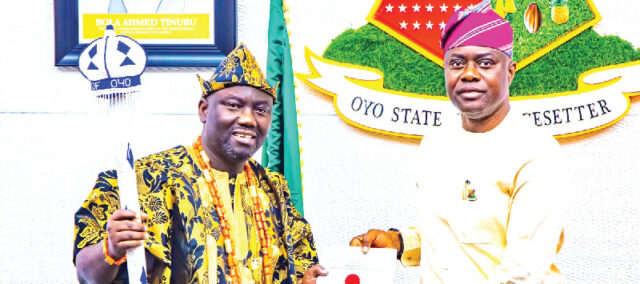In a recent development, five prominent kingmakers from Oyo town have issued a 30-day ultimatum to Governor Seyi Makinde, demanding the reversal of Prince Abimbola Owoade’s appointment as the new Alaafin of Oyo.
The kingmakers, represented by Senior Advocate of Nigeria Kunle Sobaloju, assert that the appointment is both illegal and procedurally flawed.
The Aggrieved Kingmakers Include:
- High Chief Yusuf Ayoola, the Basorun of Oyo
- High Chief Wakeel Akindele, the Laguna of Oyo
- High Chief Hamzat Yusuf, the Akinniku of Oyo
- Chief Wahab Oyetunji, a warrant chief representing the Asipa of Oyo
- Chief Gbadebo Mufutau, a warrant chief representing the Alapinni of Oyo
These traditional leaders had previously selected Prince Lukman Gbadegesin as the Alaafin-elect, a decision they claim was disregarded by the governor.
Governor Makinde, on January 10, 2025, announced Prince Owoade’s appointment, citing thorough consultations and traditional divinations conducted by the Oyomesi, the Oyo kingmakers. Subsequently, on January 13, 2025, the governor presented the staff of office to Oba Owoade in a ceremony held at the Executive Chambers of the Governor’s Office in Ibadan.
During the ceremony, Governor Makinde alleged that the previous selection process was marred by corruption and bribery, vowing to prosecute those involved. In response, the kingmakers have challenged the governor to provide concrete evidence to support his claims, urging him to present such evidence in court rather than resorting to public accusations.
The kingmakers’ ultimatum underscores the tension surrounding the selection of the new Alaafin, a process traditionally governed by the Oyomesi in accordance with native laws and customs. They warn that failure to reverse the appointment within the stipulated 30 days will result in legal action, emphasizing the need to uphold the integrity of traditional institutions and due process.
This unfolding situation highlights the complexities inherent in the selection of traditional rulers in Nigeria, where historical customs intersect with contemporary governance, often leading to disputes that require delicate navigation to preserve cultural heritage and maintain societal harmony.


























